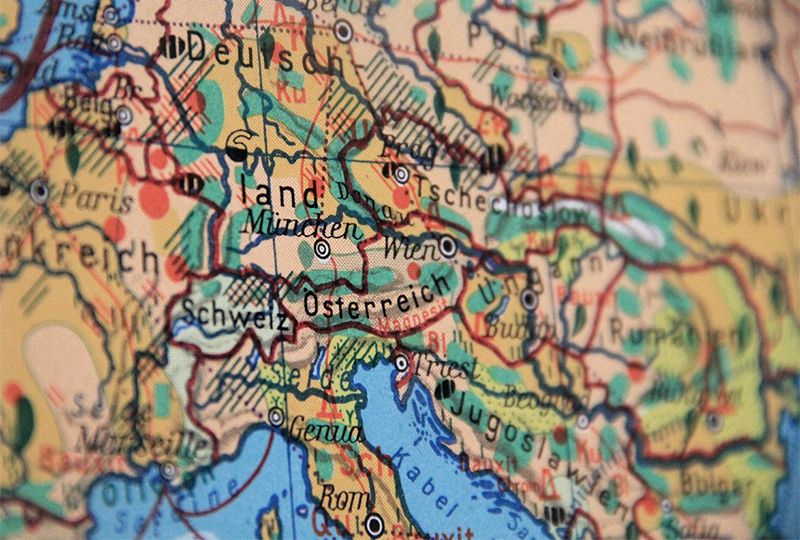The Ultimate Resource for Learning German Dialects

Languages are always fascinating to study. Even within a single country, you have different dialects that help to identify where someone was brought up. For example, if you hear someone from London, UK, talking to someone from Cork, Ireland, someone from Atlanta, Georgia, and someone from Queensland, Australia, it might sound like they are speaking three or four different languages, especially if they have a heavy accent.
This is also true in Germany and other German speaking countries. Someone from Bavaria has an unmistakable accent. They sound different to someone who grew up in Berlin or Zurich.
The more you learn a language, the easier it will be to hear the more distinct dialects when you have casual conversations with native speakers. Sometimes it will be the word choices that help you to tell the difference. Other times, you'll be able to tell where someone comes from based on their accents.

What’s a German Dialect?
Languages evolve over time, and the farther apart people are, the more varied the language changes. Some of the changes are because of the shared experience in the region. This helps to form the way the vocabulary in the different regions change. The other part of this is the way people pronounce different sounds.
The term accent refers to the way people form different sounds as they speak. As a native English speaker, you can probably tell when someone is from the southern US. If you have spent years in that region, you can start to identify the different accents from different states – someone from New York has an accent different from the accent of someone from Georgia.
Dialects include the way a person forms sounds, as well as their choice of words. Slang is likely the best example of word and phrase choice that you probably associate with a certain demographic. Slang is often attributed to younger generations, but it is also specific to regions. Consider sayings that you associate with specific regions.

What's Considered the “Proper” German?
Every language has people who feel that there is a proper version of the language, and that all of the dialects are “incorrect” versions of the language. The beauty of language is that it is constantly changing. A lot of English is evolved from German, combined with numerous other languages.
Nearly every living language today is evolved from older languages. Consider the Italian language. It has its roots in Latin, but it is decidedly not the same language. Latin is considered a dead language that is mostly only still relevant in the scientific and legal fields. Italian is its own language.
What is considered the “proper” form of a language is really more the guidelines and rules for that particular language. Some languages are much better at holding to those rules, such as German, while other languages are a lot more flexible (sometimes almost to the point of rules rarely applying), such as English.
The “proper” form of German is called High German, or Hochdeutsch. It is considered the standard German, or the one form that is almost universal. In theory, it is free of slang and dialectal influence. In reality, it changes just like dialects, just in a more uniform way. Think about how words are added to the Oxford English Dictionary every year – Hochdeutsch changes.
There is no council of Hochdeutsch to monitor or control how the German language changes. It’s not really possible to have control over a living language. Having an authority on any language spoken outside of a very small area is virtually impossible. There are a few countries that try to police their language, but Germany is not one of them.
However, German does have its own dictionary, the Mittelhochdeutsche Wörterbuch (Middle High German Dictionary) operates as a way of detailing the standards. Hochdeutsch is taught and used across German speaking countries, especially in schools. It is similar to the way English is taught and used across English speaking nations. You may get marked down for using improper punctuation and spelling, but that’s about as far as enforcement of the language goes.

How Many Regions Do people Speak German?
German is not as widely used as English, Spanish, or French. However, there are a lot of places where German is one of the languages still spoken, at least in small regions of other parts of the world. Larger pockets of German speaking people and communities exist around the globe. However, the vast majority of German speakers are in Europe.
10 Places with German as an Official Language
There are smaller pockets of German speakers in other parts of Europe and the surrounding areas. Some of these nations are fairly obvious, but some of them may come as a surprise considering they are known for having their own languages (that’s why it is recognized and official in these 10 nations:
- Czech Republic
- Denmark
- France
- Italy
- Hungary
- Poland
- Romania
- Russia
- Slovakia
- Vatican City
That last one probably came as the biggest surprise, but Vatican City recognizes most major European languages. Many of the other countries border Germany or were a part of the larger Germanic nations over the centuries.
6 Dialects in Germany and Outside Germany
There are six nations where German is considered one of the primary languages:
- Austria
- Belgium
- Germany
- Liechtenstein
- Luxembourg
- Switzerland
Each of the six nations where German is a primary language has their own unique dialects. England is a fairly small nation, but there are nearly as many distinct dialects are there are towns. For nations like Switzerland and Luxembourg, where the mountains create more remote pockets where their dialects are much more obvious to others in the nation.
With Germany having the largest population of German speakers (with more than 80 million people speaking the language), it is much easier to hear the many different dialects without having to travel to smaller areas. If you are in a major German city, you will probably hear many of the nation’s dialects – you can probably even hear them on TV and YouTube, as well as in movies.
While it is impossible to say exactly how many dialects German has – it’s pretty much impossible for any large nation to count this – there are some dialects that are fairly easy to hear if you spend a few months in Germany:
- Bavarian
- Berlin
- Franconian
- Hessian
- Soxon
- Swabian
As you learn to hear the differences in these dialects return to some of your favorite movies, shows, or channels to see if you can tell where the characters are from based on their dialects.

The Surprising Diversity and Richness of German Dialects Worldwide
Although not as widespread around the globe as several of the other European languages, there are countless German dialects around the world. It is true that a majority of the dialects are in Europe, but you can find pockets of German dialects around the world. For example, Pennsylvania “Dutch” is actually a German dialect – not Dutch.
As you learn more about the language and hear the different way words are pronounced and the use of phrases specific to new regions, you’ll start to pick up on those dialects.
